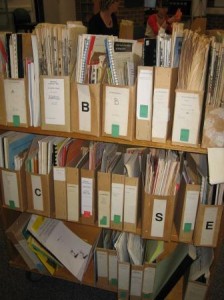So having selected a variety of ephemera materials from the Documents Collection at the University of Sussex, the latest activities have been focused on getting permission to digitise and make them available openly online. The materials themselves range from a union booklet warning of the dangers of privatising BT to a YWCA booklet entitled ‘Girls in male jobs’.

One of the challenges has been identifying someone to approach for permission. For the two documents mentioned it was fairly straight forward as BT has an archive (coincidentally also involved in a JISC-funded digitisation project ‘New Connections‘) and YWCA now exists as Platform 51. For other documents we have had to turn detective and track down publishing organisations that have gone through multiple name changes, and/or disappeared and individuals who may or may not be the person named in the particular booklet or other material. In some cases we have drawn a blank. Despite the astonishing facility of our online world to remove anonymity, some organisations and authors clearly disappeared before the digital world emerged and thus have left no trace. Or the particular item simply lacks any publishing or authorship information. In these cases we are assuming ‘orphan’ status for these documents and will go ahead and digitise and publish on the basis that they are low risk.
The other satisfying element of this stage of the project is the generally positive response that we’ve had in seeking permissions. Mostly people and organisations have been happy to respond either immediately or following a brief chat or email correspondence. We made the decision to issue a follow up email to non-respondents, which has chivvied a handful of late responses, but by the end of this month, if we have not received express permission, our note informed recipients that we would take a non-response as effective acquiescence. In some cases, we have been pleasantly surprised to be offered additional material that will either be added to the OER or used in ongoing research.